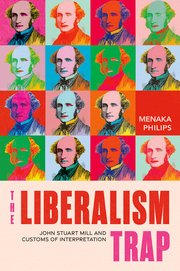
The Liberalism Trap: John Stuart Mill and Customs of Interpretation
Arguments about liberalism’s meanings, endurance, imminent death, or revival are widespread in modern political thought. But what effect do these preoccupations with liberalism have on the way political questions are taken up?
In The Liberalism Trap, Menaka Philips argues that the focus on liberalism has become a customary limit on our political imaginations. To examine the costs of that custom, Philips turns to John Stuart Mill-the so-called paradigmatic liberal. As she argues, Mill’s famed liberal status is habitually substituted for his political arguments such that the now standard association of Mill with liberalism determines how and why he is read. Philips, however, takes a break from that ready association. Her comparative reading of Mill’s work concerning women’s emancipation, class reform, and the British Empire recovers a thinker guided not by the ideological certainties he is often made out to represent, but by a politics of uncertainty-a politics which generated radical, gradualist, and paternalist strategies throughout his proposals on domestic and imperial questions.
By reading Mill against the limits of liberalism, Philips draws out the possibilities and risks of Mill’s own political practice, while inviting a critical evaluation of the customs of interpretation that shape contemporary political thought.

We, the Data: Human Rights in the Digital Age
A rallying call for extending human rights beyond our physical selves—and why we need to reboot rights in our data-intensive world.
Our data-intensive world is here to stay, but does that come at the cost of our humanity in terms of autonomy, community, dignity, and equality? In We, the Data, Wendy H. Wong argues that we cannot allow that to happen. Exploring the pervasiveness of data collection and tracking, Wong reminds us that we are all stakeholders in this digital world, who are currently being left out of the most pressing conversations around technology, ethics, and policy. This book clarifies the nature of datafication and calls for an extension of human rights to recognize how data complicate what it means to safeguard and encourage human potential.
As we go about our lives, we are co-creating data through what we do. We must embrace that these data are a part of who we are, Wong explains, even as current policies do not yet reflect the extent to which human experiences have changed. This means we are more than mere “subjects” or “sources” of data “by-products” that can be harvested and used by technology companies and governments. By exploring data rights, facial recognition technology, our posthumous rights, and our need for a right to data literacy, Wong has crafted a compelling case for engaging as stakeholders to hold data collectors accountable. Just as the Universal Declaration of Human Rights laid the global groundwork for human rights, We, the Data gives us a foundation upon which we claim human rights in the age of data.
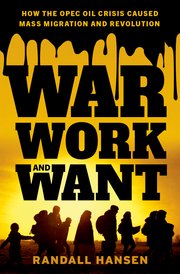
War, Work, and Want: How the OPEC Oil Crisis Caused Mass Migration and Revolution
An expansive history of how an economic shock a half century ago created a world that is addicted to mass migration.
The oil shock of 1973 changed everything. It brought the golden age of American and European economic growth to an end; it destabilized Middle Eastern politics; and it set in train processes that led to over one hundred million unexpected–and unwanted–immigrants.
In War, Work, and Want, Randall Hansen asks why, against all expectations, global migration tripled after 1970. The answer, he argues, lies in how the OPEC Oil crisis transformed the global economy, Middle Eastern geopolitics and, as a consequence, international migration. The quadrupling of oil prices and attendant inflation destroyed economic growth in the West while flooding the Middle East with oil money. American and European consumers, their wealth drained, rebuilt their standard of living on the back of cheap labor–and cheap migrants. The Middle East enjoyed the benefits of a historic wealth transfer, but oil became a poisoned chalice leading to political instability, revolution, and war, all of which resulted in tens of millions of refugees. The economic, and migratory, consequences of the OPEC oil crisis transformed the contours of domestic politics around the world. They fueled the growth of nationalist-populist parties that built their brands on blaming immigrants for collapsing standards of living, willfully ignoring the fact that mass immigration was the effect, not the cause, of that collapse.
In showing how war (the main driver of refugee flows), work (labor migrants), and want (the desire for ever cheaper products made by migrants) led to the massive upsurge in global migration after 1973, this book will reshape our understanding of the past half-century of global history.
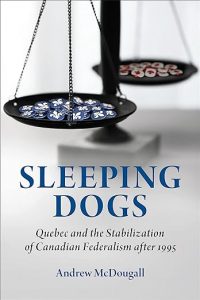
Sleeping Dogs: Quebec and the Stabilization of Canadian Federalism after 1995
What happened to the Quebec sovereignty movement after 1995? In Sleeping Dogs, Andrew McDougall reveals how a change in federalist strategy, combined with an improving political context, helped Canada stabilize its federal system and bury the “Quebec question” for the foreseeable future.
The book identifies five potential reasons the Quebec sovereignty movement lost momentum and argues that all contributed to a political environment that benefited federalists. McDougall explores topics of elite accommodation, generational change, changing identity politics, economic globalization, and constitutional fatigue. He argues that Canada’s federalist political elites have capitalized on these developments to stabilize the country by dropping the national question – even when they might still hold very different visions of the Constitution. Building on “constitutional abeyance” theory, the author conceives of this strategic change as the restoration of a constitutional abeyance among federalist actors. Considering recent history in light of subsequent developments, Sleeping Dogs is a timely and important attempt to understand the evolving situation in Quebec and Canadian federalism.

“We Are in Charge Here”: Inuit Self-Government and the Nunatsiavut Assembly
Powerful, innovative Indigenous self-governance regimes are increasingly important players in Canadian politics, but little academic work has been done on their structure, operation, and effectiveness. “We Are In Charge Here” examines the central institution of the most populous Indigenous self-governance regime in Canada, the elected Assembly of the Nunatsiavut Government.
Nunatsiavut – “our beautiful land” in Inuktitut – was established in 2006 by a modern treaty between the Labrador Inuit and the Canadian state. Graham White offers a thorough observation of the Assembly, based on interviews with Assembly members and others involved in Nunatsiavut politics, observation of Assembly sessions, and a review of official documents, in order to provide a comprehensive picture of the Assembly, its members, and its operations. The book examines the Assembly’s effectiveness in performing traditional legislative functions such as representation, policy making, and accountability. It addresses key concerns including executive-legislative power relations, Inuit influence on Assembly operations, and the Assembly’s role in realizing self-government.
Illuminating the intersection of Indigenous self-governance approaches and Western institutions, “We Are In Charge Here” will be of interest to political leaders, legislative officials, and academics concerned with the design and on-the-ground functioning of Indigenous self-government.

Infrastructuring Urban Futures: The Politics of Remaking Cities
Focusing on material and social forms of infrastructure, this edited collection draws on rich empirical details from cities across the global North and South. The book asks the reader to think through the different ways in which infrastructure comes to be present in cities and its co-constitutive relationships with urban inhabitants and wider processes of urbanization.
Considering the climate emergency, economic transformation, public health crises and racialized inequality, the book argues that paying attention to infrastructures’ past, present and future allows us to understand and respond to the current urban condition.

Beyond Racial Capitalism: Co-operatives in the African Diaspora
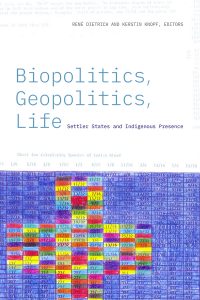
Biopolitics, Geopolitics, Life: Settler States and Indigenous Presence
The contributors to Biopolitics, Geopolitics, Life investigate biopolitics and geopolitics as two distinct yet entangled techniques of settler-colonial states across the globe, from the Americas and Hawai‘i to Australia and Aotearoa/New Zealand. Drawing on literary and cultural studies, social sciences, political theory, visual culture, and film studies, they show how biopolitics and geopolitics produce norms of social life and land use that delegitimize and target Indigenous bodies, lives, lands, and political formations. Among other topics, the contributors explore the representations of sexual violence against Native women in literature, Indigenous critiques of the carceral state in North America, Indigenous elders’ refusal of dominant formulations of aging, the governance of Indigenous peoples in Guyana, the displacement of Guaraní in Brazil, and the 2016 rule to formally acknowledge a government-to-government relationship between the US federal government and the Native Hawaiian community. Throughout, the contributors contend that Indigenous life and practices cannot be contained and defined by the racialization and dispossession of settler colonialism, thereby pointing to the transformative potential of an Indigenous-centered decolonization.
Contributors: René Dietrich, Jacqueline Fear-Segal, Mishuana Goeman, Alyosha Goldstein, Sandy Grande, Michael R. Griffiths, Shona N. Jackson, Kerstin Knopf, Sabine N. Meyer, Robert Nichols, Mark Rifkin, David Uahikeaikaleiʻohu Maile.

Plutarch’s Prism: Classical Reception and Public Humanism in France and England, 1500–1800
Throughout the early modern period, political theorists in France and England drew on the works of Plutarch to offer advice to kings and princes. Elizabeth I herself translated Plutarch in her later years, while Jacques Amyot’s famous translations of Plutarch’s The Parallel Lives led to the wide distribution of his work and served as a key resource for Shakespeare in the writing of his Roman plays, through Sir Thomas North’s English translations. Rebecca Kingston’s new study explores how Plutarch was translated into French and English during the Renaissance and how his works were invoked in political argument from the early modern period into the 18th century, contributing to a tradition she calls ‘public humanism’. This book then traces the shifting uses of Plutarch in the Enlightenment, leading to the decline of this tradition of ‘public humanism’. Throughout, the importance of Plutarch’s work is highlighted as a key cultural reference and for its insight into important aspects of public service.
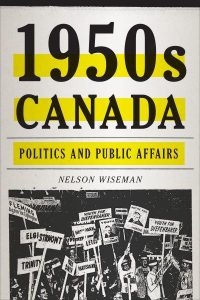
1950s Canada: Politics and Public Affairs
While the 1950s in Canada were years of social conformity, it was also a time of political, economic, and technological change. Against a background of growing prosperity, federal and provincial politics became increasingly competitive, intergovernmental relations became more contentious, and Canada’s presence in the world expanded. The life expectancy of Canadians increased as the social pathologies of poverty, crime, and racial, ethnic, and gender discrimination were in retreat.
1950s Canada illuminates the fault lines around which Canadian politics and public affairs have revolved. Chronicling the themes and events of Canadian politics and public affairs during the 1950s, Nelson Wiseman reviews social, economic, and cultural developments during each year of the decade, focusing on developments in federal politics, intergovernmental relations, provincial affairs, and Canada’s role in the world. The book examines Canada’s subordinate relationship first with Britain and then the United States, the interplay between Quebec’s distinct society and the rest of Canada, and the regional tensions between the inner Canada of Ontario and Quebec and the outer Canada of the Atlantic and Western provinces. Through this record of major events in the politics of the decade, 1950s Canada sheds light on the rapid altering of the fabric of Canadian life.